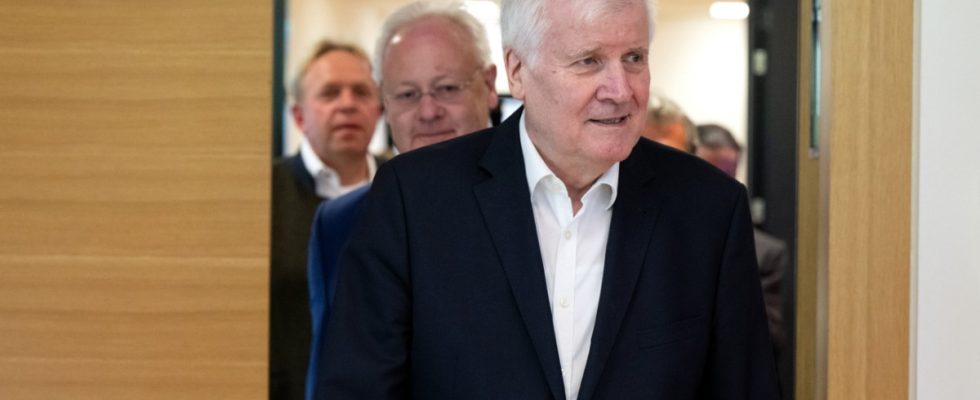Horst Seehofer, former Bavarian Prime Minister and CSU boss, is completely reticent as a pensioner with statements about his successor Markus Söder. No public advice, no public criticism, nothing like that. This Monday, however, Seehofer said something during a visit to the state parliament that made Söder look pretty bad. Very bad even. Even if Söder did not appear at all in what Seehofer said.
The former Prime Minister was invited as a witness to the billion-euro disaster in the expansion of Munich’s S-Bahn. A parliamentary committee of inquiry is to clarify how the second trunk route could be much more expensive and be completed much later than planned. The second tunnel section across Munich was planned under Seehofer as the Bavarian head of government and agreed with the federal government.
As a witness, Seehofer reported that his mentality on such large-scale projects was: “Don’t push, just decide.” As Prime Minister, he had “convened at least four railway summits under my chairmanship” for the second main line. And he decreed that the cabinet had to be reported monthly on the progress of the project. That “keeps the pressure on everyone”. If a ministry has to report regularly to the government headquarters, the State Chancellery, it is “beneficial” and “pedagogically effective”.
These statements are significant in that the State Chancellery behaved very differently under Söder’s direction. As did Söder himself. In 2020, Bavaria’s then Minister of Transport Kerstin Schreyer (CSU) and her ministry repeatedly alarmed the State Chancellery and Söders himself. At the time, there was a risk of immense cost increases and delays on the second main route, which is what happened.
Schreyer and her ministry vehemently pushed for a summit meeting to which Prime Minister Söder should invite. According to the files, there was already a date, namely October 22, 2020. There was actually a summit meeting chaired by Söder: at the end of July 2022, when the disaster could no longer be hidden. And in the meantime, according to the files, the State Chancellery had even instructed the Ministry of Transport not to press Deutsche Bahn as the client for new, up-to-date figures on construction time and costs.
The position of the State Chancellery culminated in a note from December 2020. It said that the second regular route was “not a winning topic in the election campaign”. What was meant was the 2021 federal election campaign. Seehofer did not want to comment on this note when asked by committee head Bernhard Pohl from the Free Voters. But the former prime minister said a few basic things about his style of government. You cannot “leave the course” because of an upcoming appointment. He was concerned with “truthful communication”. To exclude problems would be “negligent”.
Söder’s government and the CSU say today that it was not possible to act and provide information earlier because the railways, as the builder, have not released any figures for years. Seehofer did not comment on this, but basically he behaved differently than Söder. If a railway summit took place, “then it was prepared in such a way that we had reliable figures”. How Seehofer put pressure on as Prime Minister is documented in a letter that he sent on September 12, 2017 to the then Federal Minister of Transport, Alexander Dobrindt.
According to Seehofer, Dobrindt should make it clear to the Bahn boss that the project schedule is non-negotiable
The reason for this was possible rescheduling by Deutsche Bahn for the second trunk line. Seehofer asked Dobrindt to “make it absolutely clear” to the CEO of Deutsche Bahn that there should be no changes that would lead to delays. “Compliance with the announced schedule with the commissioning of the second main route in 2026 is non-negotiable.” At the time, it was a matter of course for Seehofer to turn to the Federal Minister of Transport and CSU party colleague Dobrindt. “The train is part of his department.”
As Federal Minister of Transport, you have to take care of the railways and their projects, said Seehofer. “That’s his business.” Committee chief Pohl from the Free Voters could not resist a dig at Andreas Scheuer, who later became Federal Transport Minister and former CSU General Secretary. Scheuer explained that “sitting here in this chair in a completely different way”.
Scheuer had recently also had to testify as a witness and explained verbosely that he actually had nothing to do with the second regular route. “That wasn’t my issue.” His Bavarian colleague contacted Scheuer in October 2020 with a request for help; by phone and by letter. Scheuer claims he never got the letter. “I do not know this letter.” And he can’t remember a phone conversation with Schreyer about this.
The Green MP Martin Runge understood Seehofer’s statements as a “message, that’s a matter for the boss, the prime minister has to take care of it personally”. Seehofer did not want to give the impression that he had provided the opposition with a template. The opposition transferred his statements to his successor. “These are the games that I have always sharply criticized in politics.” For him, the wisdom applies that every era and every politician has its own style. That is why he has been silent on Bavarian politics since leaving the posts of Prime Minister and CSU leader in 2018, said Seehofer.
But Seehofer’s words about his handling of the second trunk line had already been said. His completely different handling than was the case with Söder afterwards. The deputy head of the U-Committee and CSU MP Jürgen Baumgärtner from the CSU approached Seehofer in a way that seemed like an attempt to relieve Söder. Baumgärtner explained that during Seehofer’s reign, the Free State had concluded a contract “without a cost cap” with Deutsche Bahn for the second main line. “There is absolutely nothing in this contract.” The result is today’s disaster.

